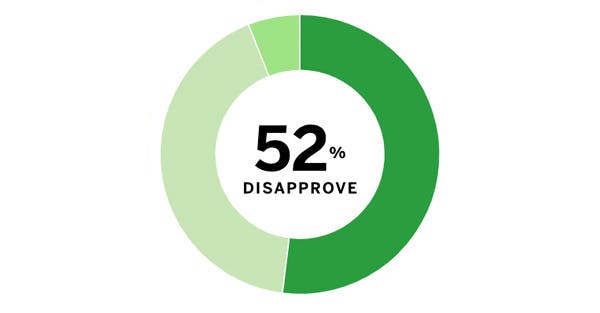More than half of Minnesotans object to President Donald Trump's approach to U.S. immigration policy — an issue the Republican president has pounded ahead of the midterm elections — according to a new Star Tribune/MPR News Minnesota Poll.
Fifty-two percent disapprove of Trump's handling of immigration policy while 42 percent approve.
When asked about building a wall along the Mexican border if the U.S. had to pay for it, 59 percent oppose the idea while 34 percent support it.
Half of all voters also believe that immigrants living in the U.S. illegally should be allowed to stay and become citizens if they meet certain requirements over time, and another 31 percent supported allowing them to stay for work only.
The poll found Minnesotans more divided on refugee resettlement. "As a mother, if I were living in a country that was war-ridden, I definitely would always do anything I can to get them to a safe place," said Gina Hass, 42, of Woodbury, who was polled.
A Democrat who works as a school administrator at St. Paul School District, Hass said officials shouldn't turn away people who want to be free. "This is a basic human right."
The president has called illegal immigration a "national emergency" and is planning to send active-duty troops to the Mexican border, officials said Thursday, while a caravan of Central American migrants, still more than 1,000 miles away, try to come here.
Support among Minnesotans for Trump's immigration policies, an early pillar of his run for office and an enduring theme at rallies, hewed closely along party lines: 96 percent of voters who identified as Democrats disapproved of the president's policies while 85 percent of Republican voters backed Trump.
Among independent voters, 47 percent supported the president on immigration while 41 percent disapproved.
Sandra Gertz, a 73-year-old from Cedar who just retired after working as a quality technician at Medtronic, identifies as independent and enthusiastically approved of Trump's immigration stance, saying she supported building a border wall "no matter who pays for it."
"Crying shame to see those people coming from Honduras and Guatemala, and you have to feel terrible for their plight, but we cannot afford to support the entire world," said Gertz, who participated in the poll.
Among independents, 58 percent opposed building the wall if the U.S. had to pay. Trump, who made building a border wall a central promise of his campaign for president, long insisted that he would make Mexico pay for the wall's construction, which would cost billions.
He has since urged Congress to appropriate funds.
Jim Honsey, a 75-year-old Rochester voter who retired after a career at IBM, also said he didn't mind if the U.S. had to instead pick up the bill.
"My common sense tells me that what we pay today on education for illegals, for medical, for welfare programs and whatever — that easily will offset building the wall," Honsey said.
The Minnesota Poll reveals broad support for granting citizenship to immigrants already in the country illegally or at least allowing them to stay and work.
This support came from a majority of voters from all regions of the state.
"Look, children have no choice about their parents bringing them across the border," Gertz said. "I mean they've been here all their lives, they know nothing else."
Shawnee Burnett, 63, of Stillwater, said immigrants should "be taken care of in a more gentle way" instead of "torn away from their poor children and kicked out of the country."
Burnett, who is retired after working as a registered nurse supervisor, identifies as an independent but said she is staying away from candidates who support Trump's policies, chiefly immigration.
In the Minnesota Poll, which surveyed 800 likely voters in telephone interviews Oct. 15-17, voters are most split on refugee resettlement.
The Minnesota Refugee Resettlement Program took in an average of almost 2,000 refugees per year from 2007 to 2015 before spiking to just about 3,000 in 2016.
Last year, the Trump administration reduced that number to about 1,000.
Minnesota voters are divided over whether to maintain the average of admitting 1,000 refugees per year (27 percent) and temporarily stopping the acceptance of refugees altogether (27 percent).
Another 25 percent say they want to return to admitting 2,000 refugees a year while 12 percent favor increasing the average to 3,000.
"Minnesota has always been — over the recent years anyway — very generous with refugees coming in," Burnett said. "I'm so softhearted I really would like to have as many as we can take [but] reducing it to a certain point I think is appropriate at this time."
The Minnesota Poll has a margin of sampling error of plus or minus 3.5 percentage points, and of those surveyed, 38 percent identified as Democrats, 33 percent as Republicans and 29 percent as independents.
Hass said immigration will "weigh heavily on my decision as a voter."
"I don't think we have the right to turn people away from wanting to be free," she said.
Stephen Montemayor • 612-673-1755 Twitter: @smontemayor
Former DFL Senate Majority Leader Kari Dziedzic dies of cancer at age 62

How the Star Tribune is covering the 2024 election

Fact check: Walz and Vance made questionable claims during only VP debate

In Tim Walz's home city, opposing groups watch him debate on the national stage

